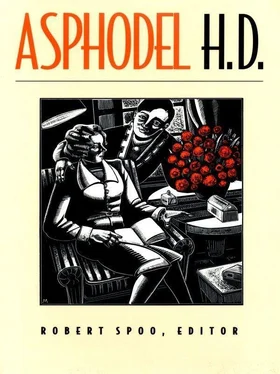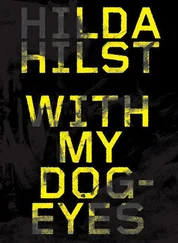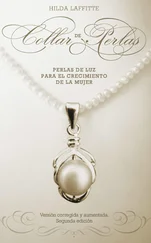Delia was coming forward and people were saying “Delia.” They said Delia up the scale, down the scale, with grace-notes, with variations on a theme. “You are a real pet” and “won’t you come tomorrow.” “The Vinney woman, no one ever saw her—” and “Delia. I know you hate them—” but—“Delia, not that Oxford frump, no not really—” and “Delia. Delia. Delia à bientôt.”
A bientôt, Delia, Delia, Delia. Delia à bientôt. “And that means soon, soon, Delia.” “But you’re not going now ?” “But everyone is going — gone. And what is there to stay for?” “O just like you. Just like you all. Can’t you see I’m tired to death. Stay Dryad.” “ Dryad , Delia?” “Yes. George says so. He says no one with any sense of humour could call you Hermione, Her Gart. He’s really rather proud of you. He says we’re all insane and he hopes you spite us.” “Spite you, Delia?” “He says you can, will if were not respectful. He has the greatest admiration for your — power.” “Power? He’s been telling me all along that my clothes look wrong, a mast and a mizzen head.” “A — a—what?” “He calls me to be exact, I don’t know what — a mast — and — a—mizzen head.” “What is?” “What is what?” “A mizzen — ha, ha, ho.” But that isn’t how people laugh. Delia sank in the empty Chesterfield, laughing, surveying the wreck of her drawing room. Feathers, pomade boxes. “One feels one should find snuffboxes people lost.” “Wh-aaat?” “It’s all like a play. It doesn’t seem real, not this room — not anything that has happened. I love all the people—” “Which, Dryad, especially?” But she wasn’t going to tell Delia. It would get quoted around and back again. They were using her as their latest little pet oracle, something odd, exotic. She wasn’t having any. “I don’t know” (she spoke at random) “that Dalton woman.” “Mary?” “How could her name be Mary? Her name isn’t, can’t be Mary.” “Why not dear? Why can’t it just be. Mary means—” “O that means the mother of — mother of—” “She has two.” “What?” But this was impossible. What did Delia mean by it? It was another of their cutting cynicisms. The Dalton woman with a fox shaped little face and enormous earrings leaning over the back of the Chesterfield, saying, “I would like to have a little knife. I would like to turn and turn and turn it in the heart of Dowel. I would like to say to Dowel now you feel ” The Dalton woman. God. Perhaps (was it possible?) she had meant it.
“Delia?” “Darling?” “You don’t mind my asking—” “Ask anything, darling.” “I mean Lillian talked about it — seemed to — want — them.” “Dear, dear Dryad — now what?” “I mean people needn’t —” “What dear?” “I mean Lillian seemed to want them but could that Dalton woman ever—” “What? What? What?” Light coming on. Someone mysterious in the hall, lighting something. Light was creeping from the hall toward the larkspur coloured woven carpet. The carpet had the oddest of lovely shades, pot-pourri rose-colour, blue of blue and dark-blue larkspur. “The carpet is like woven petals, yet somehow right — a carpet.” “Bokhara.” “Bokhara. Sounds like wine coloured — petunias—” no not petunias — a hat — jade hair pins. The light was coming nearer. “Will you have the light milady,” this is what George called back-stairs, “or do you prefer the shadows.” The shadows? Henry James. Did footmen talk like that? “Go away.” He had gone away. “Poor Dickson. He listens to our conversation. To improve his—” “ Improve his?” “Darling Dryad, don’t begin spoiling yourself by being witty. Yes. He listens. I can remember the exact inflection of poor Mary, it was only last week saying, ‘don’t, don’t let’s have the lights on Delia, I prefer the shadows.’ ”
“You’re odd here, you’re a great success here, but you don’t dress right.” “No.” “I said I don’t like that grey chiffon, it’s too nun-ish. Maybe all right for Philadelphia.” “Yes.” “I said you have to have more body to your clothes. Colour.” “Yes.” “Yes. No. Yes. Have you heard a word I’m saying?” “No. I mean yes.” “Yes, I mean no. What in Hell’s name do you mean?” “I mean really, George, does it at all really matter?”
“Well, I as your nearest male relative—” George didn’t like her. Not like her as he did in Eugenia’s little morning room that he had said (with a snort) might almost be in Chelsea. “You don’t like me here, George?” “Wh-aat?” “You don’t (in London) like me.” “I didn’t say that. I think you’re in bad hands. You keep bad company.” “Bad company — Delia?” “Delia. No not delicious Delia. Delia is Hera after a cure. Juno with all the grandeurs and no fat. Delia is the immortal Artemis garbed in violet, in the violet-woven veil of Aphrodite. Delia is a second Helen come to judgment—” “You do understand, Georgio.” “That’s what I’m here for, Dryad.” “Then who, what? What bad company? Don’t you like that Dalton woman that Delia asked to meet me?” “May I ask why Delia asked the Dalton to meet you, Dryad?” “I don’t know. It happened. The Dalton (her name is Mary) wrote Delia saying she was so unhappy—” “Again?” “Again? What do you mean again?” “I mean that Dryad. Why the Dalton?” “I told you George. She’d been writing Delia.” “O well, I suppose the most discreet must have their indiscretions. The Dalton’s dippy. Otherwise amusing.” “Dippy?” “Her husband it appears tries spasmodically to lock her up. Bug house you know. Mad.” “Is the Dalton crazy?” “Well not any more apparently than the rest of them. She’s a little cleverer that’s all. When a woman in that set, is clever (brilliantly clever) the husbands take quick action.” “Whatever do you mean, George?” “She writes. I mean doesn’t. She could if she wanted to. She’s afraid of dear Freddie or Teddie or Algy. (Morris I think his name is.) She’s afraid if she gets any further forwarder, he will descend and cop her.” “George. You’re so crazy. Yourself. Can’t you tell me?” “I am. I have been.” “Delia says—” “Never mind what Delia says. What do you think?”
“I don’t know what I think dear George. I saw her face over the back of a Chesterfield and hated her.” “Hated her? Why Dryad?” “I don’t know. Something she said about Walter.” “What Dryad?” “She said she wanted to turn and turn a steel knife in his heart and say now you feel .” “Rather neat that. Old Forgeron makes one angry.” “You angry?” “O well not angry, Dryad. Helpless.” “Helpless?” “Well not so much helpless as hopeless. Abandon hope all ye who enter here . The cold irradiance of the well-cut glacier.” “Well-cut?” “Yes. Perfectly tailored. The glacier à la mode.” “I suppose that’s funny. The sort of thing all you people repeat to one another. It is rather.” “Thank you, Dryad. But I started saying I don’t like your friends.” “But who George? And why don’t you?” “I mean her Dryad. The She of the piece. She’s done things to you. You’re not the same. Altered imperceptibly. Not to notice. But I notice.” “Wh-aat, George?” “You and she would have been burned in Salem for witches—” “O George, George, you said that long ago. . and that was why everything happened. Don’t go on saying it.” “Burnt.” “You shouldn’t have — you shouldn’t have. You should never have said that, George Lowndes. You might have helped her.” “Help her, Gawd Almighty — Orpheus or (who was it?) Orestes rends assistance to the Furies. She has a face like a Burne Jones fury. Have you seen them? In one of your eternal galleries. Not the Tate. I think the South Kensington—” “Yes. I’ve been there.” “Where haven’t you been Dryad?” “I don’t — know George.” “Dryad. Piqued again. Or peeved merely?” “I don’t know, George. I hoped you’d — help even now, you might help Fayne Rabb.”
Читать дальше












